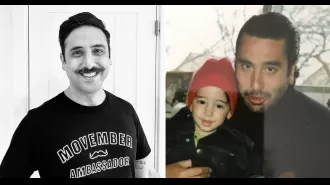She was my world, but she couldn't recall our marriage.
We had a beautiful life, but it hurt that she couldn't recall it.
September 21st 2024.

Mima and I had a love story that spanned over five decades. From the moment I met her, I was captivated by her presence and her stunning smile. It was the early 1960s in Hong Kong and my colleague had set me up on a blind date with his sister. Despite my bank's strict rule against employees marrying during their first tour of duty, I couldn't resist and we eloped after just six months of dating. I may have lost my job, but I had gained the love of my life.
Fast forward to 2017, and I found myself silently walking out of the memory clinic with Mima by my side. We had just received the news that she had late-onset Alzheimer's disease, the most common form of dementia. I was in a state of shock, to say the least. Looking back, I realize that there were signs of her declining memory for months, but I didn't want to admit it to myself.
It all started in the summer of 2016 when Mima began forgetting small things like her age or whether she had eaten. She would also forget about plans we had made. At first, I didn't think much of it, but as time went on, I noticed bigger changes. My wife, who used to remember every important date and anniversary, now couldn't recall how long we had been together or even her own married surname. It was heartbreaking to see her struggling with something that had always come so naturally to her.
One thing that Mima had always been passionate about was the cinema. She would often amaze me with her knowledge of movie plots and characters, sometimes even predicting the ending before the film had begun. But now, she would suddenly ask me who a character was in the middle of a scene. It was so unlike her. This was when I knew I had to take action and made an appointment with our GP, who referred us to a memory clinic.
I wasn't sure if Mima had dementia at that point, but I was concerned. During her cognition test, she was asked simple questions like the date and who the prime minister was. She was also given practical tasks, like drawing a clock face and adding a specific time to it. It was heartbreaking to see her struggle with these tasks that she would have aced in the past. After the tests, we received a formal diagnosis, and it hit me like a ton of bricks when the memory specialist bluntly told us, "Mima has late-onset Alzheimer's disease."
For me, it was a shock, even though I had suspected it. I wasn't prepared for this and didn't know what to do or what questions to ask. Mima, on the other hand, showed no reaction. She also had trouble sleeping and would often get confused about the time of day. But the hardest thing for me was when she started to forget my name and our relationship. We had built a beautiful life together and it broke my heart that she couldn't remember any of it.
We had adopted a daughter after struggling with several miscarriages, and watching her grow up was the highlight of our lives. But now, Alzheimer's was taking away all those precious memories from Mima. It seemed so unfair. Despite all of this, Mima never lost her smile, her sense of humor, or her interest in others. Over the next seven years, I watched her disease progress like a descending staircase, with periods of stability followed by another step down.
But through it all, we stayed by each other's side, holding onto the love that had brought us together all those years ago. And even though her memory may have faded, the love we shared remained as strong as ever.
Mima and I met on a blind date in the bustling city of Hong Kong in the early 1960s. My colleague had set us up, hoping to introduce me to his single sister. From the moment I saw her, I was immediately struck by her presence and beautiful smile. Despite my bank's strict policy against marrying on the first tour of duty, I couldn't resist and six months later, we secretly tied the knot. I lost my job, but I had gained the love of my life.
Fast forward to 2017 and here I was, walking out of the memory clinic with Mima by my side. We had just received the devastating news that she had late-onset Alzheimer's disease. To say I was in shock would be an understatement. Looking back, there were signs that something was wrong, but I had brushed them off as minor slip-ups. Mima had started forgetting little things like her age and whether or not she had eaten. She would also forget important arrangements we had made. But it wasn't until she started struggling with bigger changes, like forgetting our anniversary and not recognizing her own married name, that I began to worry.
Mima had always been a movie buff and could recite plots and characters like the back of her hand. But suddenly, she would ask who a character was in the middle of a scene. It was so unlike her, and it only added to my growing concern. I decided to make an appointment with our GP, who then referred us to the memory clinic. I wasn't sure if the GP or I suspected dementia, but it was a possibility that I couldn't ignore.
At the memory clinic, Mima went through a series of tests, including a cognition test and practical tasks like drawing a clock face. The results confirmed our worst fears - Mima had late-onset Alzheimer's disease. The memory specialist delivered the diagnosis bluntly, leaving me reeling. Despite my suspicions, hearing it out loud was a shock and I didn't know how to react. Mima, on the other hand, showed no reaction.
As we left the clinic with a few informational leaflets, I could feel a sense of dread settling in. And it wasn't long before Mima started experiencing hallucinations. She would hear voices and see figures in the room. It was heartbreaking to see her upset, but I learned to reassure and comfort her instead of trying to convince her that there was nothing there. The illness also affected her sleep and her sense of time, making it difficult for her to differentiate between day and night.
But the hardest thing for me to deal with was that Mima no longer remembered my name or our relationship. We had shared a beautiful life together and it broke my heart that she couldn't remember any of it. We had even adopted a daughter after several miscarriages, and watching her grow up was the highlight of our lives. But now, this illness was slowly taking away all those precious memories from Mima. It seemed so cruel and unfair.
Despite everything, Mima never lost her smile, her sense of humor, and her interest in those around her. Over the next seven years, I watched as her Alzheimer's progressed like a descending staircase, with her symptoms plateauing for a while before taking another step down. It was a heartbreaking journey, but I was grateful for every moment I got to spend with my beloved wife.
Fast forward to 2017, and I found myself silently walking out of the memory clinic with Mima by my side. We had just received the news that she had late-onset Alzheimer's disease, the most common form of dementia. I was in a state of shock, to say the least. Looking back, I realize that there were signs of her declining memory for months, but I didn't want to admit it to myself.
It all started in the summer of 2016 when Mima began forgetting small things like her age or whether she had eaten. She would also forget about plans we had made. At first, I didn't think much of it, but as time went on, I noticed bigger changes. My wife, who used to remember every important date and anniversary, now couldn't recall how long we had been together or even her own married surname. It was heartbreaking to see her struggling with something that had always come so naturally to her.
One thing that Mima had always been passionate about was the cinema. She would often amaze me with her knowledge of movie plots and characters, sometimes even predicting the ending before the film had begun. But now, she would suddenly ask me who a character was in the middle of a scene. It was so unlike her. This was when I knew I had to take action and made an appointment with our GP, who referred us to a memory clinic.
I wasn't sure if Mima had dementia at that point, but I was concerned. During her cognition test, she was asked simple questions like the date and who the prime minister was. She was also given practical tasks, like drawing a clock face and adding a specific time to it. It was heartbreaking to see her struggle with these tasks that she would have aced in the past. After the tests, we received a formal diagnosis, and it hit me like a ton of bricks when the memory specialist bluntly told us, "Mima has late-onset Alzheimer's disease."
For me, it was a shock, even though I had suspected it. I wasn't prepared for this and didn't know what to do or what questions to ask. Mima, on the other hand, showed no reaction. She also had trouble sleeping and would often get confused about the time of day. But the hardest thing for me was when she started to forget my name and our relationship. We had built a beautiful life together and it broke my heart that she couldn't remember any of it.
We had adopted a daughter after struggling with several miscarriages, and watching her grow up was the highlight of our lives. But now, Alzheimer's was taking away all those precious memories from Mima. It seemed so unfair. Despite all of this, Mima never lost her smile, her sense of humor, or her interest in others. Over the next seven years, I watched her disease progress like a descending staircase, with periods of stability followed by another step down.
But through it all, we stayed by each other's side, holding onto the love that had brought us together all those years ago. And even though her memory may have faded, the love we shared remained as strong as ever.
Mima and I met on a blind date in the bustling city of Hong Kong in the early 1960s. My colleague had set us up, hoping to introduce me to his single sister. From the moment I saw her, I was immediately struck by her presence and beautiful smile. Despite my bank's strict policy against marrying on the first tour of duty, I couldn't resist and six months later, we secretly tied the knot. I lost my job, but I had gained the love of my life.
Fast forward to 2017 and here I was, walking out of the memory clinic with Mima by my side. We had just received the devastating news that she had late-onset Alzheimer's disease. To say I was in shock would be an understatement. Looking back, there were signs that something was wrong, but I had brushed them off as minor slip-ups. Mima had started forgetting little things like her age and whether or not she had eaten. She would also forget important arrangements we had made. But it wasn't until she started struggling with bigger changes, like forgetting our anniversary and not recognizing her own married name, that I began to worry.
Mima had always been a movie buff and could recite plots and characters like the back of her hand. But suddenly, she would ask who a character was in the middle of a scene. It was so unlike her, and it only added to my growing concern. I decided to make an appointment with our GP, who then referred us to the memory clinic. I wasn't sure if the GP or I suspected dementia, but it was a possibility that I couldn't ignore.
At the memory clinic, Mima went through a series of tests, including a cognition test and practical tasks like drawing a clock face. The results confirmed our worst fears - Mima had late-onset Alzheimer's disease. The memory specialist delivered the diagnosis bluntly, leaving me reeling. Despite my suspicions, hearing it out loud was a shock and I didn't know how to react. Mima, on the other hand, showed no reaction.
As we left the clinic with a few informational leaflets, I could feel a sense of dread settling in. And it wasn't long before Mima started experiencing hallucinations. She would hear voices and see figures in the room. It was heartbreaking to see her upset, but I learned to reassure and comfort her instead of trying to convince her that there was nothing there. The illness also affected her sleep and her sense of time, making it difficult for her to differentiate between day and night.
But the hardest thing for me to deal with was that Mima no longer remembered my name or our relationship. We had shared a beautiful life together and it broke my heart that she couldn't remember any of it. We had even adopted a daughter after several miscarriages, and watching her grow up was the highlight of our lives. But now, this illness was slowly taking away all those precious memories from Mima. It seemed so cruel and unfair.
Despite everything, Mima never lost her smile, her sense of humor, and her interest in those around her. Over the next seven years, I watched as her Alzheimer's progressed like a descending staircase, with her symptoms plateauing for a while before taking another step down. It was a heartbreaking journey, but I was grateful for every moment I got to spend with my beloved wife.
[This article has been trending online recently and has been generated with AI. Your feed is customized.]
[Generative AI is experimental.]
0
0
Submit Comment





